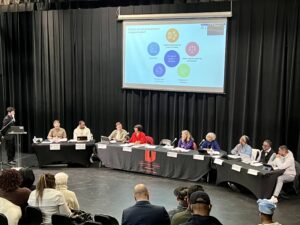 The “Future of Health” Community Benefits
The “Future of Health” Community Benefits
- Update: Meeting #4 – November 1, 2023
- Learn More about the Project
- Transit and Mobility
- Racial Equity Framework
The fourth community benefits meeting for the Future of Health project was held Wednesday, November 1, 2023 at the University Prep Academy. At the previous meeting members of the Neighborhood Advisory Council (NAC) were seated.
On Nov 1, 2023, NAC Chair Steven Rimmer resigned due to a change in residency. The NAC voted to move the alternate member, Benjamin Bennett to the council and to make Lynda Jeffries the Chair. More on the undemocratic nature of this process below.
The NAC failed to take action or respond to the requests from community and disability advocates to change the location of the meeting due to lack of accessibility and safety concerns about the bleacher seating for elders and all attendees.
The Failure of the NAC to vote on a Racial Equity Framework
Based on community input, resident elected rep Joanne Adams made a motion for the NAC to use a Racial Equity Framework to help guide their work and the project. Rather than pick up this vital tool to NAC members decided to push the decision until the next meeting. We are hopeful that the NAC will follow through on their commitment to learn more about the need and benefit of utilizing a racial equity framework for the project.
The failure of the Neighborhood Advisory Council to adopt a racial equity framework is disappointing. The developers, reps from Henry Ford Hospital, Michigan State University, and the Detroit Pistons, sat on their hands rather than step up to respond to community concerns around racial equity and the project. Furthermore, the city’s Planning and Economic Development Department failed to properly prioritize racial equity.
Why do we need a Racial Equity Framework? Look around.
The application of a Racial Equity Framework is an accountability tool that will allow community to track what the developers agree to, what they say, what they do and the project’s impacts. One of the objections from an NAC member was that racial equity is somehow embedded in the process. The gap between talking about racial equity and manifesting it is on display everywhere. There is no evidence to the use of a racial equity framework in previous CBO Agreements. On the contrary, there’s ample evidence to the harms that previous agreements have had on majority Black Detroit.
If racial equity were embedded in the policies and practices of the city would we have lost 100,000 Black Detroiters in the last 10 years?
- Would we see increased disparity between the income of white and Black Detroiters?
- Would we be repeatedly positioning our public tax resources to fund private luxury projects?
- Would the air quality violations by Stellantis still be happening if a racial equity framework had been used in that agreement?
- Would developers resign themselves to paying fines rather than hire Black Detroiters?
- The list goes on and on.
Many of the present-day disparities and inequities that exist across neighborhoods are rooted in long standing systemic and structural racism and in policy and practices that influence where we live, how we live, and how we earn a living. Racial injustice has been normalized in Detroit, so much so that when people stand up and ask for what is right and just, they are silenced, disrespected, and even attacked. The Racial Equity Framework is an extra level of protection for majority Black Detroit.
Lack of Democracy
The CBO Process is led by the Planning and Economic Development Department. Recently, in a Detroit News article about the Future of Health Antoine Bryant, Detroit's director of planning and development, said of the process; "It's democracy in its purest form, and we get to see it live and in person." Contrary to Director Bryant’s statement, the department has been extremely undemocratic in the way that they have managed the process.
They are exploiting the gaps in the ordinance and organizing against community interest. By failing to exercise the opportunity to maintain community elected leadership they have leaned the NAC toward Henry Ford, Michigan State University and Tom Gores. They should have advised the NAC to promote one of the existing co-vice chairs into the vacant leadership role. Now there is a super-majority of department-appointed members. We really need an extra level of accountability and tracking.
Poor performance of the NAC
With few exceptions, members of the NAC seemed totally unprepared. Many of them had not attended any of the 70+ meetings held by the developer team prior to the start of the CBO process so they have a great deal of information to take in. They acknowledged their lack of preparedness and have promised to come back right. There is concern they don’t realize the importance of their role. One even referenced keeping to the developer’s impacts; a position that is unacceptable from a body that are supposed to be negotiating on behalf of community.
These are OUR Tax dollars! Participate!
Attend a Future of Health Community Benefits meeting.
Meetings on Tuesdays at 6:00 PM
Note: NO meeting on November 21, the week of Thanksgiving.
University Prep High School, Ed Parks Campus
610 Antoinette St. Detroit, MI 48202
VIEW REMOTELY VIA ZOOM
Register to receive meeting link: https://bit.ly/futureofhealthdetroit
Dial by phone: +1 312 626 6799
Meeting ID: 873 4667 3162
City of Detroit’s Project Website: https://detroitmi.gov/departments/planning-and-development-department/design-and-development-innovation/community-benefits-ordinance/ongoing-cbo-engagement/future-health-detroit